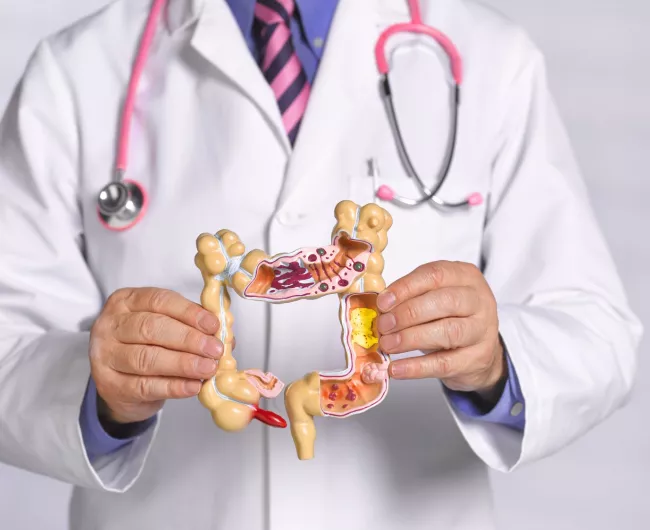Nutrition with Low Anterior Resection Syndrome
Have you had a lower anterior resection or any other surgery for colon or rectal cancer? Most surgery patients experience some form of LAR Syndrome.

What is LARS?
Most patients who have surgery for colon or rectal cancer including LAR (lower anterior resection) may experience LAR syndrome. The large bowel absorbs water from the materials you eat to form a stool (bowel movement). When part of the colon is removed, it causes a decrease in water absorption which creates urgency and a more liquid stool. It takes time for the colon to re-train itself.
Not all patients experience every symptom, everyone is unique. Some patients may notice that their symptoms resolve over time, while others may continue to have symptoms. Most people generally improve within two years.
What are the symptoms of LARS?
Talk to your doctor if more-frequent bowel movements are also accompanied by any of the following signs or symptoms:
- Changes in the consistency, volume or appearance of your bowel movements, such as repeatedly passing narrow, ribbon-like stools or loose, watery stools
- Abdominal pain
- Blood, mucus or pus in your feces
What are some helpful hints?
Here are some helpful hints for you:
- Chew food thoroughly.
- Keep a food journal. A pattern may develop, you will learn what helps and what may trigger an episode.
- Try small, frequent meals (5-6 per day). Skipping meals may worsen watery stools and cause increased gas.
- Start with a lower fiber diet, slowly add back new foods including fiber, whole grains, green leafy vegetables one at a time, giving yourself days in between to evaluate your response.
- Drink plenty of fluids. Sip fluids slowly and drink either between meals or at the end of a meal.
- Avoid caffeine and/or alcohol. This can worsen stool output.
- Eat foods high in soluble fiber (oatmeal, rice bran, barley, apples, etc) and consider fiber supplements. Psyllium-based products improve stool consistency by absorbing water but not reducing the volume. This may help slow and thicken the stool.
- Milk and milk products contain lactose and can worsen diarrhea for some people. Try lactose free milk or lactase enzyme tablets if the milk affects you.
- Add foods that thicken the stool into your diet. These include applesauce, bananas, cheese, peanut butter, potatoes, white pasta, pretzels, white rice, white bread, yogurt, marshmallows, tapioca.
- Foods that can cause gas are cabbage, spinach, broccoli, cauliflower, Brussels sprouts, radishes, carbonated beverages, onions, beans, corn, cucumbers nuts, beer and dairy products. If you have a gluten intolerance, breads and pastas may be problematic unless gluten-free.
- For cramping or gas pains, use anti-gas and/or antidiarrheal over-the-counter medications as well as warm ginger ale (take out the carbonation). Lie on your back and gently bring your knees to your chest to try to relieve excess gas. Walking helps too.
- Muscle strengthening exercises (Kegal) combined with dietary changes may help with urgency and stool incontinence.
- Exercise at least 30 minutes a day, 5 days a week. Walking works! Try to include strength training exercises (such as lifting weighted objects, floor exercises and stretch/ resistance bands) at least 2 days per week.
- Imodium AD is an anti-diarrheal medication that is available over the counter that is well-tolerated and may improve anal sphincter pressure. This helps thicken stool as well as helps with stool incontinence.
- For clustering of bowel movements, try Imodium AD. Imodium should be taken before loose bowel movements, ideally 30 minutes before meals and at bedtime. A probiotic such as FloraQ, Align or VSL #3 (available online) may be helpful. Citrucel or Metamucil, one dose in a glass of water or juice at bedtime.
- Carry a survival pack consisting of wet wipes, protective ointments (example: Calmoseptine or other diaper-type barrier ointments), and Imodium AD.
- In addition to over the counter anti-diarrhea medications, doctors can prescribe Cholestyramine which is a cholesterol-lowering drug but is commonly used to treat diarrhea.
- Tincture of opium as an antidiarrheal agent can be prescribed by your doctor. It slows transit of intestinal contents by increasing intestinal smooth muscle tone, water is absorbed from fecal contents, decreasing diarrhea.
- Fiber supplements may help constipation by adding bulk to the stool as well as diarrhea by absorbing water from the stool. If you experience frequent small movements like pellets, this may help put them together and form one larger movement.
- Magnesium supplements may also help to promote regularity in bowel movement when low level constipation is a problem; magnesium is also lost with loose stools so daily supplementation (200-800 mg/day) may be preventive.
For cramping or gas pains, use antidiarrheal over the counter medications as well as warm ginger ale (to take out the carbonation). Lie on your back and gently bring your knees to your chest to try to relieve excess gas. Walking helps too.
Top resources
Nutrition and lifestyle tips to help prevent colorectal cancer
When you pay attention to nutrition, you are ensuring that you maintain adequate levels of essential vitamins and nutrients to help keep your body healthy.
New Integrative Health and Wellness Program Responds to Patient Needs
The launch of the Alliance's Integrative Health and Wellness program comes after a survey conducted earlier this year showed that patients, survivors, and caregivers receive inconsistent information about integrative health and wellness, if they receive any information at all. The survey also showed that most individuals who have participated in these activities have noticed a positive difference in their quality of life.

Colon cancer and hydration: Keeping well and staying healthy
There are various steps you can take to check your hydration levels, and to remedy them if you’re suffering the effects of a lack of fluid.





